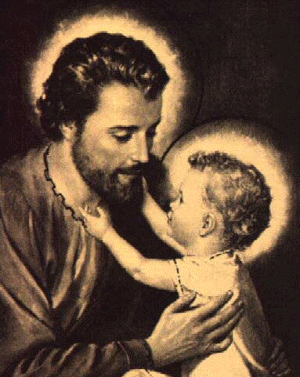
Saint Joseph (c100BC-1AD)
Feast Days: March 19, May 1
The Husband of Mary
The Church celebrates the Feast Day of St. Joseph twice a year, as the Husband of Mary on March 19, and St. Joseph the Worker on May 1. Let us take a moment to reflect on this great Saint. There had been at least two popes who had written exhortations to the faithful regarding St. Joseph: Pope Leo XIII in his papal encyclical Quamquam Pluries on August 15, 1889 and Pope John Paul II in his apostolic exhortation Redemptoris Custos in August 15, 1989. In these papal documents, both popes had sought to promote the devotion to St. Joseph.
While the Annunciation of the birth of our Lord Jesus to the Virgin Mary was recorded in Luke’s Gospel (Lk 1:26-38), one can say that the Annunciation to Joseph can be found in Matthew’s Gospel (Mt 1:18-25). On one hand, the angel Gabriel was sent from God to tell Mary that she had been chosen by God to be the mother of His Son; on the other hand, an angel of the Lord appeared to Joseph in a dream telling him not to divorce Mary, to take Mary into his home and to name the child Jesus. The role of naming a son belonged to a father, therefore in effect, the angel was telling Joseph that God had chosen him to take the role of an earthly father to Jesus. Just as Mary consented to God’s will, Joseph also consented by doing as the Lord had commanded him. Joseph’s consent united him in a very special way to the consent of Mary. They both accepted in faith the mystery of the Incarnation, and together, Mary and Joseph became the first guardians of this divine mystery.
Through the Incarnation, Jesus became part of a human family. Such is a testament of God’s great love for humanity. In this human family, Joseph is the father: his fatherhood is not due to his begetting of the Son of God; rather, his fatherhood is due to the authentic role and mission of a father to Jesus. At the finding in the temple in Jerusalem, Mary asked Jesus: “Son, why have you treated us so? Behold, your father and I have been looking for you anxiously” (Lk 2:48). Jesus answered, “How is it that you sought me? Did you not know that I must be in my Father’s house?” (Lk 2:49) There really is no conflict between Mary’s question and Jesus’ answer. Mary’s question confirmed the human nature of Jesus; Jesus’ response confirmed His divine nature. The conclusion of this Gospel passage also confirmed the role of Mary and Joseph as Jesus’ human parents: “He went down with them and came to Nazareth, and was obedient to them” (Lk 2:51).
In his papal encyclical Quamquam Pluries, Pope Leo XIII exhorted the faithful to pray for the protection of St. Joseph as Patron of the whole Church; he explained: “The reasons why St. Joseph must be considered the special patron of the Church, and for the Church to derive great hope from his care and patronage, chiefly arise from his having been the husband of Mary and having assumed the role of the earthly father of Jesus. Joseph was in his day the lawful and natural guardian, head and defender of the Holy Family. It is thus fitting and most worthy of Joseph’s dignity that, in the same way that he once kept unceasing holy watch over the family of Nazareth, so now does he protect and defend with his heavenly patronage the Church of Christ.”
Exactly one hundred years later, Pope John Paul II exhorted the faithful in Redemptoris Custos: “May St. Joseph become for all of us an exceptional teacher in the service of Christ’s saving mission, a mission which is the responsibility of each and every member of the Church. This just man, who bore within himself the entire heritage of the Old Covenant, was also brought into the “beginning” of the New and Eternal Covenant in Jesus Christ. May he show us the paths of this saving Covenant as we stand at the threshold of the next millennium, in which there must be a continuation and further development of the “fullness of time” that belongs the ineffable mystery of the Incarnation of the Word.”
Let us now conclude this reflection on St. Joseph with this prayer: May St. Joseph obtain for the Church and for the world, as well as for each of us, the blessing of the Father, Son and Holy Spirit. Amen.